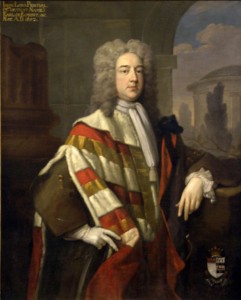
James Edward Oglethorpe, founder of the colony of Georgia, was born on December 22, 1696, in Yorkshire, England. After graduating from Eton and Corpus Christi College, Oxford, Oglethorpe began a military career in 1717, fighting against the Turks under Prince Eugene of Savoy.
Championing the Oppressed
From 1722 to 1743, Oglethorpe served in the British House of Commons, gaining a reputation as the champion of the oppressed. He pressed for the elimination of English prison abuses and, in 1732, defended the North American colonies’ right to trade freely with Britain and the other colonies.
Founding a Colony
The prison reforms Oglethorpe had championed soon inspired him to propose a charity colony in American. On June 9, 1732, the crown granted a charter to the Trustees for Establishing the Colony of Georgia. Oglethorpe himself led the first group of 114 colonists on the frigate Anne, landing at the site of today’s Savannah on February 1, 1733. The original charter banned slavery and granted religious freedom, leading to the foundation of a Jewish community in Savannah.
The Battle of Bloody Marsh
In 1742, Oglethorpe called upon his military experience and Georgia’s fledgling militia to defend the colony from a Spanish invasion on St. Simons Island. Oglethorpe and his militia defeated the invaders in the Battle of Bloody Marsh, which is credited as the turning point between England and Spain’s fight for control of southeastern North America.
An Opponent of Slavery
In 1746, Oglethorpe was falsely accused of treason by a disgruntled military office and driven from public life, although he retained his title as general and – at the time of the American Revolution—was the senior office in the British Army. He did not publicly comment on the war, but in private he tried to convince the government to negotiate a truce in 1777-1778. Throughout his life, Oglethorpe remained an outspoken opponent of slavery in the colonies.
“Great Esteem”
James Edward Oglethorpe died on June 30, 1785. Three weeks before his death he called on John Adams, newly appointed ambassador to England from the United States of America, to express his “great esteem and regard for America”—the new country in whose creation he had played and important role.
Compiled by Wm. Bradford Smith
